Mitsubishi ASX vs Toyota Aygo – Which model is better for everyday use?
Everyday use, family trips or long-distance drives – here’s where the differences show.
Discover whether Mitsubishi ASX or Toyota Aygo fits your lifestyle better.
Here’s where it gets real: The technical differences in detail
Costs and Efficiency: Price and efficiency are key factors when choosing a car – and this is often where the real differences emerge.
Toyota Aygo has a noticeable advantage in terms of price – it starts at 15500 £, while the Mitsubishi ASX costs 20600 £. That’s a price difference of around 5057 £.
Fuel consumption also shows a difference: the Mitsubishi ASX manages with 4.40 L and is therefore minimal more efficient than the Toyota Aygo with 4.80 L. The difference is about 0.40 L per 100 km.
Engine and Performance: Under the bonnet, it becomes clear which model is tuned for sportiness and which one takes the lead when you hit the accelerator.
When it comes to engine power, the Mitsubishi ASX has a clearly edge – offering 158 HP compared to 72 HP. That’s roughly 86 HP more horsepower.
In acceleration from 0 to 100 km/h, the Mitsubishi ASX is convincingly quicker – completing the sprint in 8.50 s, while the Toyota Aygo takes 15.50 s. That’s about 7 s faster.
In terms of top speed, the Mitsubishi ASX performs to a small extent better – reaching 180 km/h, while the Toyota Aygo tops out at 158 km/h. The difference is around 22 km/h.
There’s also a difference in torque: the Mitsubishi ASX pulls significantly stronger with 270 Nm compared to 93 Nm. That’s about 177 Nm difference.
Space and Everyday Use: Beyond pure performance, interior space and usability matter most in daily life. This is where you see which car is more practical and versatile.
Seats: Mitsubishi ASX offers a bit more seating capacity – 5 vs 4.
In curb weight, the Toyota Aygo is clearly perceptible lighter – 1015 kg compared to 1296 kg. The difference is around 281 kg.
In terms of boot space, the Mitsubishi ASX offers significantly more room – 484 L compared to 231 L. That’s a difference of about 253 L.
In maximum load capacity, the Mitsubishi ASX performs significantly better – up to 1596 L, which is about 767 L more than the Toyota Aygo.
When it comes to payload, Mitsubishi ASX noticeable takes the win – 449 kg compared to 345 kg. That’s a difference of about 104 kg.
Our conclusion: The Mitsubishi ASX proves to be is largely superior and thus becomes our DriveDuel Champion!
Overall, Mitsubishi ASX is the better all-rounder in this comparison.
Mitsubishi ASX
The Mitsubishi ASX presents itself as a compact crossover that combines practicality with style. Its sleek design and versatile interior make it an appealing choice for both urban and rural settings. With a focus on providing a comfortable driving experience, the ASX also offers a range of modern features that enhance connectivity and safety.
details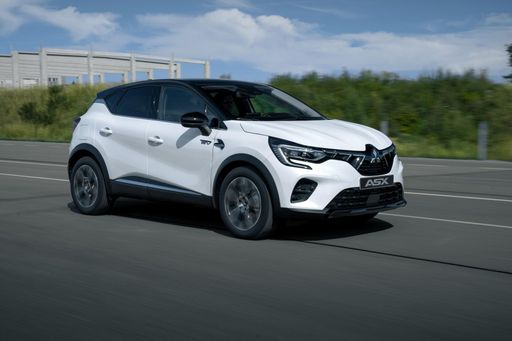 @ Mitsubishi
@ Mitsubishi
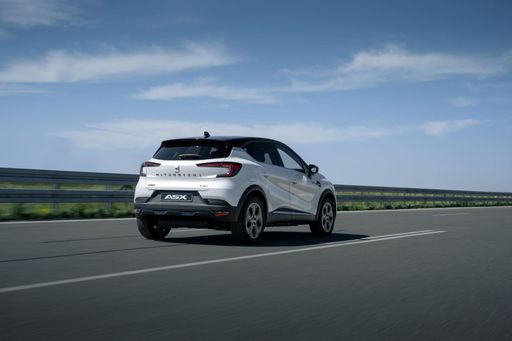 @ Mitsubishi
@ Mitsubishi
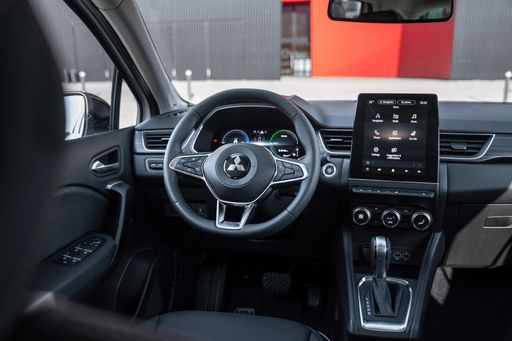 @ Mitsubishi
@ Mitsubishi
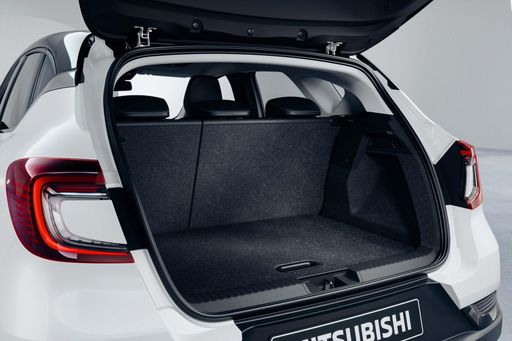 @ Mitsubishi
@ Mitsubishi
Toyota Aygo
The Toyota Aygo presents itself as a compact city car, perfect for navigating tight urban spaces with ease. Its stylish design is complemented by a vibrant variety of colour options, making it a standout choice for those looking to express their individuality. Inside, the Aygo offers a comfortable and functional cabin, equipped with modern features that enhance the overall driving experience.
details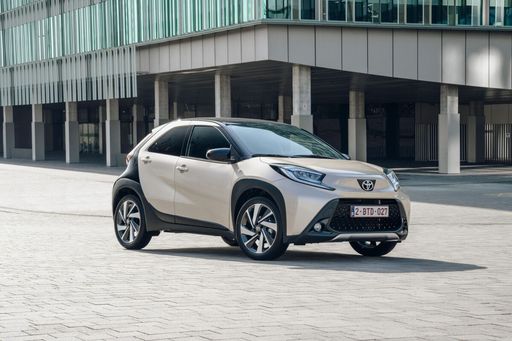 @ Toyota
@ Toyota
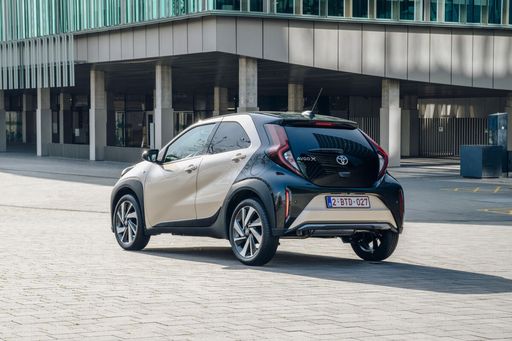 @ Toyota
@ Toyota
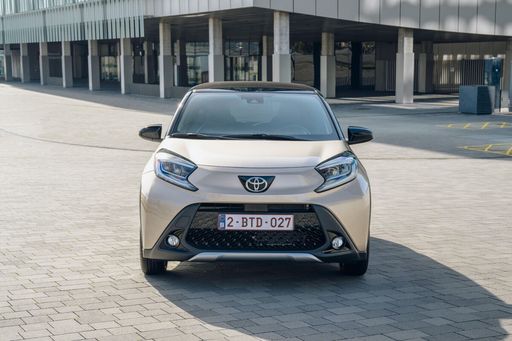 @ Toyota
@ Toyota
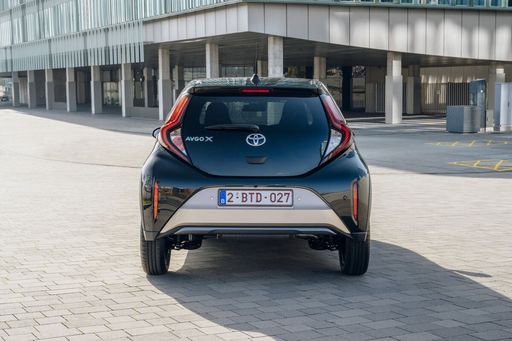 @ Toyota
@ Toyota
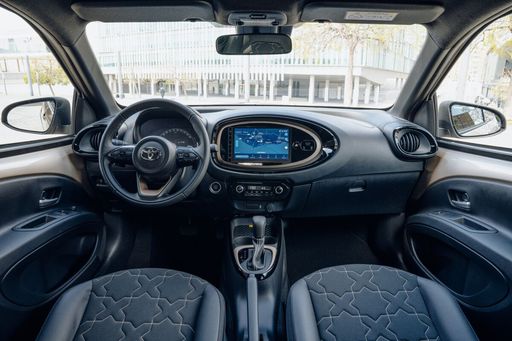 @ Toyota
@ Toyota
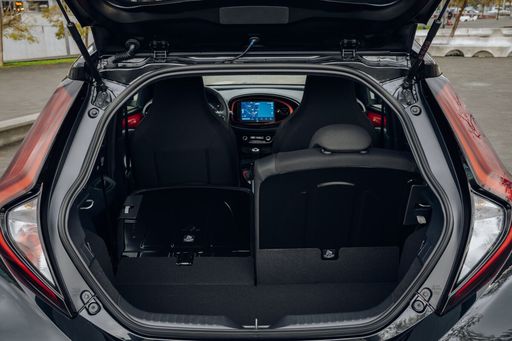 @ Toyota
@ Toyota

|

|
|
|
|
Costs and Consumption |
|
|---|---|
|
Price
20600 - 32500 £
|
Price
15500 - 22100 £
|
|
Consumption L/100km
4.4 - 6 L
|
Consumption L/100km
4.8 - 4.9 L
|
|
Consumption kWh/100km
-
|
Consumption kWh/100km
-
|
|
Electric Range
-
|
Electric Range
-
|
|
Battery Capacity
-
|
Battery Capacity
-
|
|
co2
99 - 135 g/km
|
co2
108 - 111 g/km
|
|
Fuel tank capacity
48 L
|
Fuel tank capacity
35 L
|
Dimensions and Body |
|
|---|---|
|
Body Type
SUV
|
Body Type
SUV
|
|
Seats
5
|
Seats
4
|
|
Doors
5
|
Doors
5
|
|
Curb weight
1296 - 1493 kg
|
Curb weight
1015 kg
|
|
Trunk capacity
348 - 484 L
|
Trunk capacity
231 L
|
|
Length
4239 mm
|
Length
3700 mm
|
|
Width
1797 mm
|
Width
1740 mm
|
|
Height
1575 mm
|
Height
1510 mm
|
|
Max trunk capacity
1458 - 1596 L
|
Max trunk capacity
829 L
|
|
Payload
397 - 449 kg
|
Payload
345 kg
|
Engine and Performance |
|
|---|---|
|
Engine Type
Petrol, Petrol MHEV, Full Hybrid
|
Engine Type
Petrol
|
|
Transmission
Manuel, Automatic
|
Transmission
Manuel, Automatic
|
|
Transmission Detail
Manual Gearbox, Dual-Clutch Automatic, Automatic Gearbox
|
Transmission Detail
Manual Gearbox, CVT
|
|
Drive Type
Front-Wheel Drive
|
Drive Type
Front-Wheel Drive
|
|
Power HP
91 - 158 HP
|
Power HP
72 HP
|
|
Acceleration 0-100km/h
8.5 - 14 s
|
Acceleration 0-100km/h
15.5 - 15.6 s
|
|
Max Speed
168 - 180 km/h
|
Max Speed
151 - 158 km/h
|
|
Torque
160 - 270 Nm
|
Torque
93 Nm
|
|
Number of Cylinders
3 - 4
|
Number of Cylinders
3
|
|
Power kW
67 - 116 kW
|
Power kW
53 kW
|
|
Engine capacity
999 - 1789 cm3
|
Engine capacity
998 cm3
|
General |
|
|---|---|
|
Model Year
2024 - 2025
|
Model Year
2024 - 2025
|
|
CO2 Efficiency Class
D, C
|
CO2 Efficiency Class
C
|
|
Brand
Mitsubishi
|
Brand
Toyota
|
What drive types are available for the Mitsubishi ASX?
Available configurations include Front-Wheel Drive.
The prices and data displayed are estimates based on German list prices and may vary by country. This information is not legally binding.
